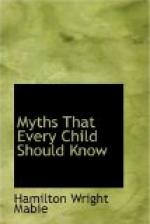“Let me go home!” cried Proserpina—“let me go home!”
“My home is better than your mother’s,” answered King Pluto. “It is a palace, all made of gold, with crystal windows; and because there is little or no sunshine thereabouts, the apartments are illuminated with diamond lamps. You never saw anything half so magnificent as my throne. If you like, you may sit down on it, and be my little queen, and I will sit on the footstool.”
“I don’t care for golden palaces and thrones,” sobbed Proserpina. “Oh, my mother, my mother! Carry me back to my mother!”
But King Pluto, as he called himself, only shouted to his steeds to go faster.
“Pray do not be foolish, Proserpina,” said he, in rather a sullen tone, “I offer you my palace and my crown, and all the riches that are under the earth; and you treat me as if I were doing you an injury. The one thing which my palace needs is a merry little maid, to run up stairs and down, and cheer up the rooms with her smile. And this is what you must do for King Pluto.”
“Never!” answered Proserpina, looking as miserable as she could. “I shall never smile again till you set me down at my mother’s door.”
But she might just as well have talked to the wind that whistled past them; for Pluto urged on his horses, and went faster than ever. Proserpina continued to cry out, and screamed so long and so loudly that her poor little voice was almost screamed away; and when it was nothing but a whisper, she happened to cast her eyes over a great, broad field of waving grain—and whom do you think she saw? Whom but Mother Ceres, making the corn grow, and too busy to notice the golden chariot as it went rattling along. The child mustered all her strength, and gave one more scream, but was out of sight before Ceres had time to turn her head.
King Pluto had taken a road which now began to grow excessively gloomy. It was bordered on each side with rocks and precipices, between which the rumbling of the chariot wheels was reverberated with a noise like rolling thunder. The trees and bushes that grew in the crevices of the rocks had very dismal foliage; and by and by, although it was hardly noon, the air became obscured with a gray twilight. The black horses had rushed along so swiftly that they were already beyond the limits of the sunshine. But the duskier it grew, the more did Pluto’s visage assume an air of satisfaction. After all, he was not an ill-looking person, especially when he left off twisting his features into a smile that did not belong to them. Proserpina peeped at his face through the gathering dusk, and hoped that he might not be so very wicked as she at first thought him.
“Ah, this twilight is truly refreshing,” said King Pluto, “after being so tormented with that ugly and impertinent glare of the sun. How much more agreeable is lamp-light or torchlight, more particularly when reflected from diamonds! It will be a magnificent sight when we get to my palace.”




